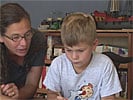SEL Parent Workshops: How Group Dynamics Enhance Problem-Solving and Parenting Skills

Check out our blog for social-emotional learning articles, news, and more!
 Perrin, E.C., Sheldrick, R.C., McMenamy, J.M., Henson, B.S., Carter, A.S. (2014). Improving parenting skills for families of young children in pediatric settings: a randomized clinical trial. JAMA Pediatrics 168(1):16-24. doi: 10.1001/jamapediatrics.2013.2919.
Perrin, E.C., Sheldrick, R.C., McMenamy, J.M., Henson, B.S., Carter, A.S. (2014). Improving parenting skills for families of young children in pediatric settings: a randomized clinical trial. JAMA Pediatrics 168(1):16-24. doi: 10.1001/jamapediatrics.2013.2919.
Disruptive behavior disorders such as Attention Deficient/Hyperactivity Disorder and Oppositional Defiant Disorder are common and stable throughout childhood. These disorders cause long-term morbidity but benefit from early intervention. While symptoms are often evident before preschool, few children receive appropriate treatment during this period. Group parent training such as the Incredible Years has been shown to be effective in improving parenting strategies and reducing children's disruptive behaviors. Because they already monitor young children's behavior and development, primary care pediatricians are in a good position to intervene early when indicated.
OBJECTIVE: To investigate the feasibility and effectiveness of parent-training groups delivered to parents of toddlers in pediatric primary care settings.
DESIGN, SETTING, AND PARTICIPANTS: This randomized clinical trial was conducted at 11 diverse pediatric practices in the Greater Boston area. A total of 273 parents of children between 2 and 4 years old who acknowledged disruptive behaviors on a 20-item checklist were included.
INTERVENTION: A 10-week Incredible Years parent-training group co-led by a research clinician and a pediatric staff member.
MAIN OUTCOMES AND MEASURES: Self-reports and structured videotaped observations of parent and child behaviors conducted prior to, immediately after, and 12 months after the intervention.
RESULTS: A total of 150 parents were randomly assigned to the intervention or the waiting-list group. An additional 123 parents were assigned to receive intervention without a randomly selected comparison group. Compared with the waiting-list group, greater improvement was observed in both intervention groups (P < .05). No differences were observed between the randomized and the nonrandomized intervention groups.
CONCLUSIONS AND RELEVANCE: Self-reports and structured observations provided evidence of improvements in parenting practices and child disruptive behaviors that were attributable to participation in the Incredible Years groups. This study demonstrated the feasibility and effectiveness of parent-training groups conducted in pediatric office settings to reduce disruptive behavior in toddlers.





